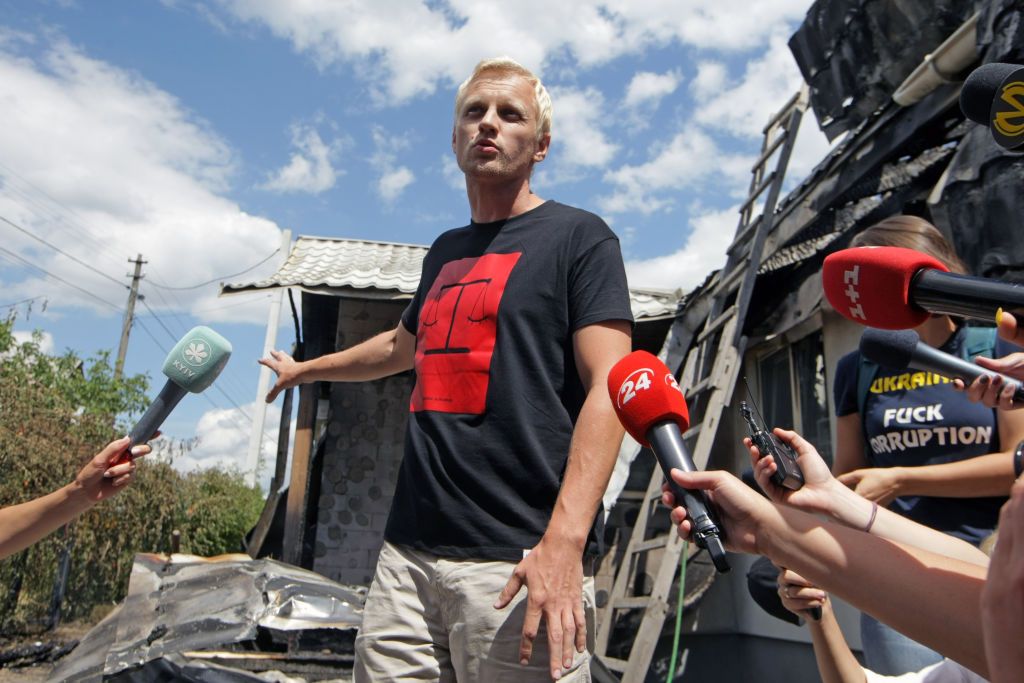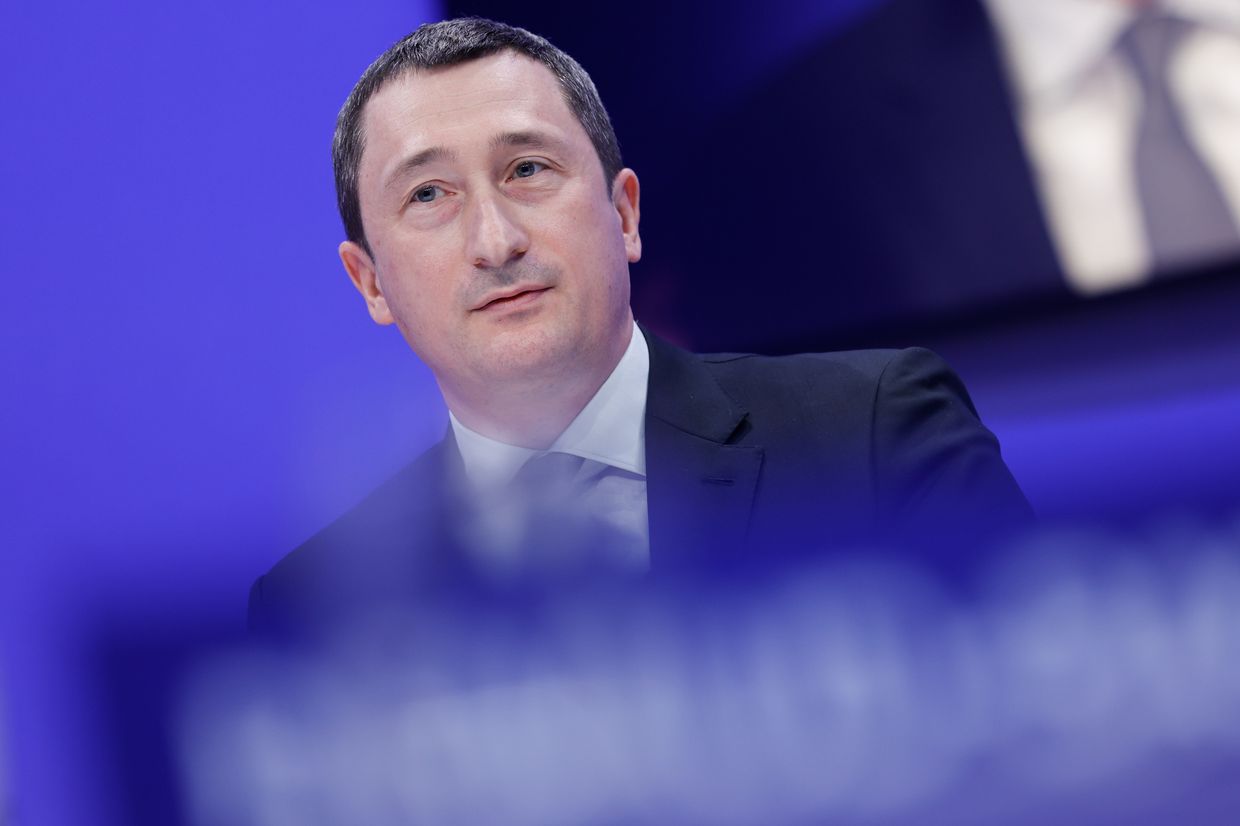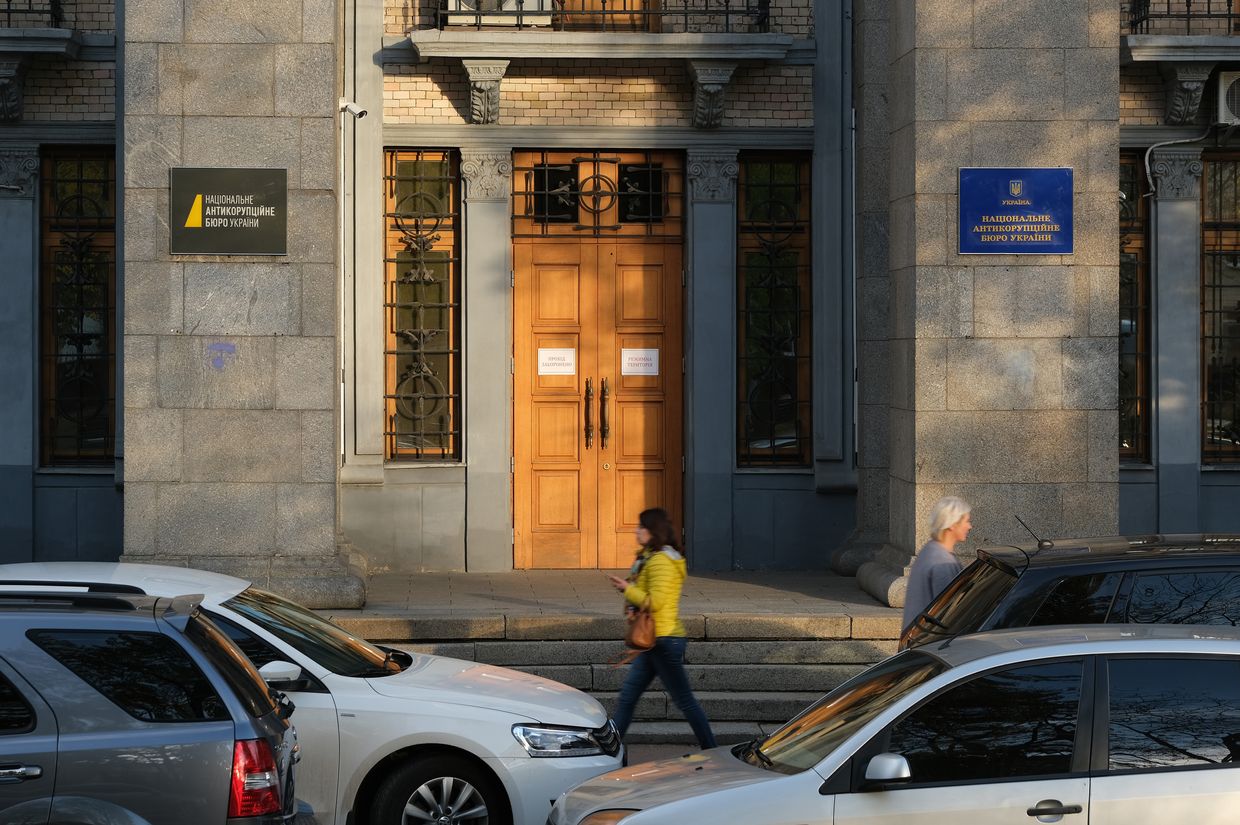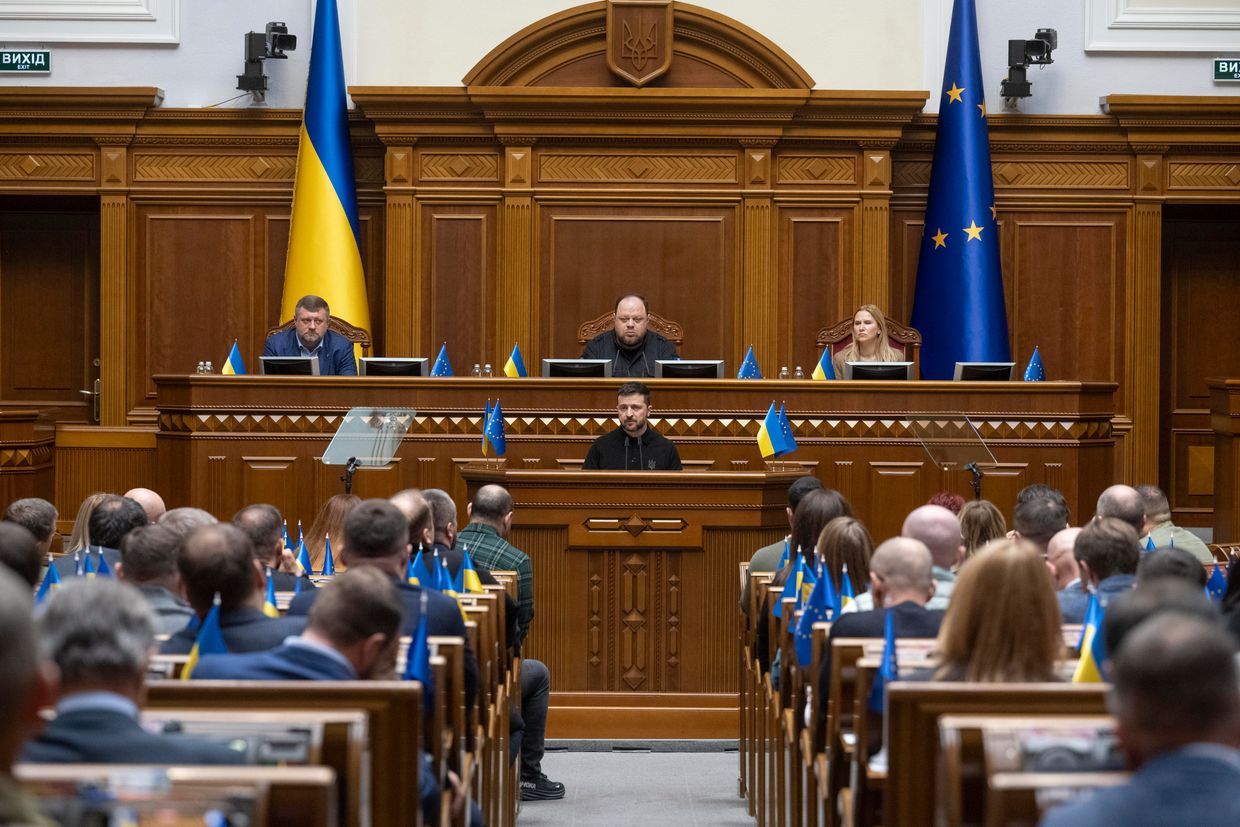The crackdown on Ukraine's anti-corruption agencies, explained

President Volodymyr Zelensky during the 76th NATO Summit at the World Forum in The Hague, Netherlands, on June 24, 2025. (Beata Zawrzel / NurPhoto via Getty Images)
Editor's note: President Zelensky signed the bill into law on the evening of July 22, which you can read about here.
Ukraine's independent anti-corruption institutions had a rough Monday.
The Prosecutor General's Office, the Security Service of Ukraine (SBU), and the State Investigation Bureau conducted at least 70 searches in premises connected to the National Anti-Corruption Bureau (NABU), which investigates top-level corruption.
The opened probes target at least 15 NABU employees. Most of the cases involve traffic accidents, while some of the NABU employees are also accused of having links to Russia.
The Security Service also searched the Special Anti-Corruption Prosecutor's Office (SAPO), which prosecutes corruption.
The sweeping searches, which involve a variety of cases, are seen as an attempt by authorities to bring independent anti-corruption institutions under government control.
"The special operation has all signs of an attempt to dismantle the anti-corruption infrastructure," Daria Kaleniuk, executive director of the Anti-Corruption Action Center, told the Kyiv Independent. "We are witnessing a decade of anti-corruption efforts in Ukraine being dismantled. This is a 180-degree turn away from European integration."

The Anti-Corruption Action Center's head, Vitaliy Shabunin, was himself charged on July 11 with evading military service and fraud. Shabunin, who has been serving in the army since 2022 and has been vocal in pointing out corruption and government overreach, says the charges are a political vendetta for his anti-corruption activities.
The searches and charges against anti-corruption activists and those tasked with investigating high-level corruption come amid an attempt by the government to pass a bill that would provide de facto amnesty for corruption in the defense industry.
The Prosecutor General's Office declined to comment, while the President's Office, State Investigation Bureau, NABU, and SAPO did not respond to requests for comment.

Searches at NABU
The searches began when NABU Chief Semen Kryvonos and Chief Anti-Corruption Prosecutor Oleksandr Klymenko were in the U.K. on a work trip. Following the searches, they ended their trip and rushed back to Ukraine.
The National Anti-Corruption Bureau said the searches had been conducted without search warrants.
Law enforcement officers used physical force against one of the NABU detectives, the bureau added.
The Security Service claimed in a statement that searches without a court warrant were legal if issuing such a warrant may undermine investigations that are targeting "links to Russia."

They did not go into detail on how traffic accidents are linked to Russia.
The searches coincided with other actions that critics say are part of a coordinated crackdown on anti-corruption institutions.
The bureau said the SBU had initiated checks of NABU employees' access to state secrets. According to the NABU, the Security Service may thus get access to NABU investigative data and undermine the bureau's investigations.
The Special Anti-Corruption Prosecutor's Office (SAPO) also said that the Security Service had conducted a check of SAPO employees' access to state secrets.
As part of this check, Security Service employees got access to all SAPO and NABU operations and investigations, the Special Anti-Corruption Prosecutor's Office said.
Responding to the allegations, the Security Service denied receiving access to all NABU and SAPO operations and investigations. Commenting on the NABU's claim that the Security Service may leak investigative data from the bureau, the service argued that such statements were "unfounded and manipulative."
Meanwhile, the State Service for Special Communications and Information Protection began checking NABU's technical infrastructure.
Alleged links to Russia
The Security Service said it had detained a NABU employee suspected of spying for Russia and charged him with high treason.
The SBU claimed that the NABU employee had received instructions from Dmytro Ivantsov, a former Ukrainian official linked to the country's ousted pro-Russian President Viktor Yanukovych. Ivantsov was allegedly recruited by Russia's Federal Security Service (FSB).
The NABU commented on the employee in a statement on July 21 without naming him. It said that the Security Service had not provided any evidence that the NABU employee was passing any information to Russian intelligence agencies.
The Security Service also said it had detained Ruslan Mahamedrasulov, the head of one of the NABU's detective units.
Mahamedrasulov, based in Dnipro, is in charge of the NABU's activities in Dnipropetrovsk and Zaporizhzhia oblasts. The SBU suspects him of maintaining contacts with Russia and serving as an intermediary in cannabis sales to the Russian republic of Dagestan.
The SBU also claimed that Mahamedrasulov is in contact with Fedir Khrystenko, a pro-Russian lawmaker who has fled Ukraine. The Security Service alleged that Khrystenko has "vast influence" over the bureau.
Mahamedrasulov didn't disclose that his father was a Russian citizen when he was given access to state secrets, which violated Ukrainian law, according to the Security Service.
The Prosecutor General's Office claimed that the pro-Russian lawmaker Khrystenko had also been in contact with Oleksandr Skomarov, head of another NABU detective unit.
Skomarov's wife used a car owned by Khrystenko's family to leave Ukraine in 2022, according to the Prosecutor General's Office.
Skomarov's subordinates also helped oligarch Hennady Boholyubov to illegally cross the Ukrainian border in 2024, the prosecutors claimed.
Kaleniuk and Kateryna Butko, head of the anti-corruption watchdog AutoMaidan, told the Kyiv Independent that Russian moles could work at any government agency but it was not a valid reason for destroying the NABU as an institution.
Critics argue that the searches are not a genuine attempt to punish crime and are politically motivated, targeting one of Ukraine's last independent institutions.
Kaleniuk argued that there are grounds to look for Russian spies at the Security Service as well.
Oleksandr Yakymenko, who headed the SBU under Yanukovych, has been charged with high treason for collaborating with Russia during the full-scale invasion.
Another former head of the SBU, Ivan Bakanov, was fired in 2022 for failing to purge the service of Russian agents, among other official reasons.
One of Bakanov's top aides and head of an SBU branch, Oleh Kulinich, was charged with high treason in 2022 for allegedly collaborating with Russia.
Destroying the NABU's independence
Critics argue that the searches, which target one of Ukraine's last independent institutions, are not a genuine attempt to punish crime and are politically motivated.
The fact that law enforcement agencies decided to delve into traffic accidents from several years back shows that this is a coordinated political crackdown on the NABU, Butko said.
Kaleniuk believes that the operation against the NABU aims to undermine the bureau's investigations, pressure its leadership, and "transform the NABU into a loyal satellite that fulfills (government) orders."
Kaleniuk also said the authorities may try to pass a law bringing the NABU under the prosecutor general's control or limiting its jurisdiction.
They may also use the National Security and Defense Council to sanction NABU officials, she added.

A source at the NABU, who requested anonymity citing possible government pressure, told the Kyiv Independent that, in their view, this is a deliberate attack on the institution itself.
"They reopened cases that are years old," the source said. "The scale and brazenness of it all point clearly to a government-ordered campaign. I don't rule out the fact that the story with Mahamedrasulov might be real. But everything else is being done under the cover of that story. This is preparatory fire aimed at launching some major changes in the bureau."
Yaroslav Zheleznyak, a lawmaker from the opposition Holos party, also said this is an attempt to eliminate the NABU's independence.
He argued that it will be hard for the authorities to do that through parliament, and they are more likely to crack down on the bureau through the Cabinet or the National Security and Defense Council.
Why is a crackdown happening now?
Kaleniuk, Butko and the NABU source argued that the bureau's recent investigations against President Volodymyr Zelensky's inner circle likely triggered the latest crackdown.
They referred to the case against former Deputy Prime Minister Oleksiy Chernyshov, who was charged with bribery and abuse of power in June, and an embezzlement case against a relative of Timur Mindich, a film producer and co-owner of Zelensky's Kvartal 95 production company.
"The Americans are not interested in the rule of law in Ukraine, and they have pulled out of the country."
Skomarov, one of the NABU detectives targeted by law enforcement agencies, was in charge of the Chernyshov case.
"The bureau has long been a thorn in (the authorities') side," the NABU source said. "None of the high-profile operations in recent years were coordinated with the President's Office, which really irritates them. After each blow dealt to incumbent top officials, signals came in saying it would end badly for the bureau."
Kaleniuk argued that the lack of a Western reaction to the Ukrainian authorities' crackdowns on anti-corruption activists and institutions had encouraged the government to launch further attacks.
She added that the EU had been reluctant to be tough on the Ukrainian government and, without U.S. leadership, Europe had been unable to pressure Ukraine on reforms.

"Our Western partners are silent," she said. "There has been a turnaround in the U.S. (after Donald Trump returned to the White House). The Americans are not interested in the rule of law in Ukraine, and they have pulled out of the country."
Meanwhile, the West appeared to take a tougher stance later on July 21.
Katarína Mathernova, the EU's ambassador to Ukraine, said on X that "now it is as important as ever to preserve the reform achievements to maintain the support needed to prevail over the enemy."
The G7 Ambassadors issued a statement on X saying they are "closely following today's developments at NABU, including the investigation of several NABU employees for alleged crimes."
"We met today with NABU, have serious concerns and intend to discuss these developments with government leaders," the group added.
"We all have a shared commitment to support transparency, independent institutions, and good governance, and we value our partnerships in Ukraine to combat corruption together."













